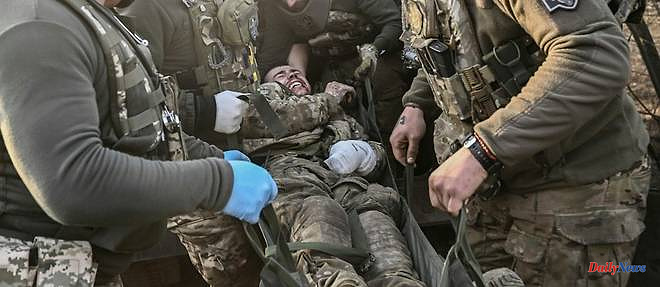Roadside at dusk. A medical team from the Ukrainian forces waits, latex gloves in their hands, for the arrival of armored vehicles with on board the wounded from the battle for Bakhmout, the longest and bloodiest of the war in Ukraine.
Based in a village near the front line, these rescuers pick up injured soldiers and perform emergency medicine, such as suturing wounds, performing tracheostomies, or draining blood-filled lungs after trauma.
Patients are then transferred to field clinics where they will be stabilized for hospitalization in the nearest large town, Kramatorsk.
When they receive a call, the team rushes on the dusty roads around Chassiv Iar, a town which itself is constantly under fire from the Russian artillery.
That day, after an exchange by walkie-talkie embellished with swearing, two tanks arrive in turn. The rescuers go into action and unload the vehicles of four wounded.
A dark-haired man is livid but can still walk, another, lying on a stretcher, winces in pain but makes the V for victory with his fingers.
In the second tank, one of the wounded did not survive. Carefully, his body is placed in a black body bag. Next to the deceased, a soldier walks somehow, suffering from a concussion.
Rescuers quickly transfer victims to their ambulances and speed up, sometimes leaving the road to cut across fields.
Andriï, 30, was a maxillofacial surgeon before the war. He enlisted in March 2022, shortly after the start of the Russian invasion of his country.
Visibly moved by the death of one of the wounded, he explains that the soldier died of hemorrhage after a leg injury. "I didn't know him, but he was young. The injury was very serious," he says.
"It's our normal day. Not normal that the guy died, but everything else was a normal day," he continued.
Andriï has been deployed in many areas of intense fighting over the past year, such as Lyssytchansk, an eastern city that fell into Russian hands last summer, or Kherson, capital of the eponymous southern region that Ukrainian forces liberated in November 2022.
But the battle of Bakhmout is the worst of all, he says.
"We have a lot of amputations, injuries to the skulls, abdominal injuries," he says, explaining that the majority of amputations concern the arms.
The group's anesthesiologist, who goes by his nom de guerre "Marik", explains that two of the soldiers injured that day received splinters in their limbs, but rescuers were able to remove their tourniquets, restoring blood circulation . They are therefore no longer at risk of being amputated.
The medical unit belongs to the famous nationalist "Da Vinci" battalion whose young commander Dmytro Kotsioubailo, a national hero, died this month on the front lines. President Volodymyr Zelensky came to meditate in front of his remains, during a solemn tribute in the center of kyiv.
The lifeguard team spends its days and nights in a small hut. When they are not deployed, they rest there, enjoy the internet thanks to a StarLink antenna, listen to music while drinking tea and cleaning their ambulances.
When an emergency call comes in, they rush towards the vehicles.
Liana, a 25-year-old nurse who joined in 2019, says she thinks of nothing so as not to let the dead affect her: the young woman says she keeps "a cool head".
"The morale of our team is very good," she said.
24/03/2023 11:32:00 - Tchassiv Iar (Ukraine) (AFP) - © 2023 AFP












